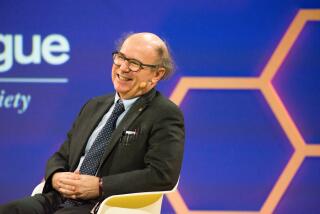A Daunting Prospect: God as Random Chance
- Share via
In writing recently about human creativity and the origin of life--two subjects that are well over my head--I observed that I regarded life as the product of Random Chance.
Several readers have pointed out that this is probably a misinterpretation of Darwin’s theory of evolution, and is outmoded by modern scientific thought.
I feel obliged to say how I came about that notion. I was walking one day along the beach in front of our Baja house when it suddenly occurred to me that God’s name was Random Chance. (Thus the capital letters). It was a flash of intuition. Scientists say human life is far too complex to have evolved by random chance, though chance certainly played a part in it. As several readers have pointed out, Richard Dawkins, in “The Blind Watchmaker,” holds that the universe evolved, without design, by what he calls “cumulative selection.” Stephen Jay Gould, in “Wonderful Life,” calls this force “contingency,” observing that A became B and B became C and C became D, and so on, each stage being contingent on the last. Both hold that blind chance could not have produced life.
But both deny that there was any design, any purpose, or any watchmaker.
I hate to give up the name Random Chance, which has served me very well, but one must adjust one’s beliefs to the new theories of the scientists. It just won’t do to say “Contingency Chance,” or “Cumulative Selection.” I liked Random Chance because it sounded like a river-boat gambler.
Meanwhile, J. David Archibald, professor of biology at San Diego State University, chides me for saying that “life is the product of random chance, but that cannot be proved, and some scientists deny it.”
Prof. Archibald points out that science can prove nothing: “There are differing views on how science progresses, but one common precept is that science cannot prove anything to be true. Rather, it proposes theories that have the potential of being falsified , though totally falsifying a theory is not even possible.”
Does that mean that if I say God’s name is Random Chance they can’t prove it isn’t true?
Prof. Archibald says no: “Even though we have far more questions than answers about the origin of life, we do know with as much certainty as one has in science that the combination of elements and molecules to form early life was far from being a totally random process.”
Thayer Smith writes again to say that in summarizing the calculations of Boyd Benson, professor of mathematics at Rio Hondo Community College, I did not grasp the magnitude of Prof. Benson’s conclusion. The question was, how long would it take a billion monkeys to correctly type the first paragraph of Dickens’ “A Tale of Two Cities.”
Smith suggests that I was “daunted” by the figures and backed off from quoting them, merely noting Prof. Benson’s monumental understatement that it would take “too long to be considered.”
Actually, I was daunted. I talked to Prof. Benson on the telephone, and although he verified what I took to be his conclusions, I could not believe them. Smith reminds me that the figure was 15 billion (the age of the universe) times 6 followed by 888 zeros. Smith typed out the zeros, which took two-thirds of a page.
Dawkins sets a simpler task for a baby, a monkey or a random computer: typing, at random, the phrase “Methinks it is like a weasel.” He says it would take about a million million million million million years. However, he says, if a computer is programmed to examine each letter and choose those that most resemble the target phrase, the results are rather faster. He programmed a computer that did it in 11 seconds. That is the difference between random chance and cumulative selection.
Jim Karugg and Bill Stewart each sent me a copy of “Inflexible Logic,” a short story by Russell Maloney in which a wealthy dilettante named Bainbridge sets six chimpanzees at work on typewriters in his conservatory. At once they begin typing out such classics as Trevelyan’s “Life of Macaulay,” the Confessions of St. Augustine, “Vanity Fair” and the Essays of Montaigne--letter perfect, page after page. A scientist, Prof. Mallard, is so deranged by this astounding feat that he arrives armed one day and shoots all the monkeys to death. He and Bainbridge then kill each other.
Perhaps I should take a lesson from that story and quit fooling around with things I don’t understand.
On the other hand, who knows when I might be hit by another flash of intuition?






